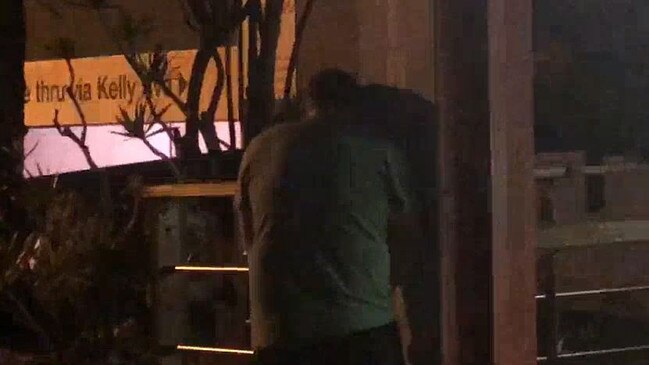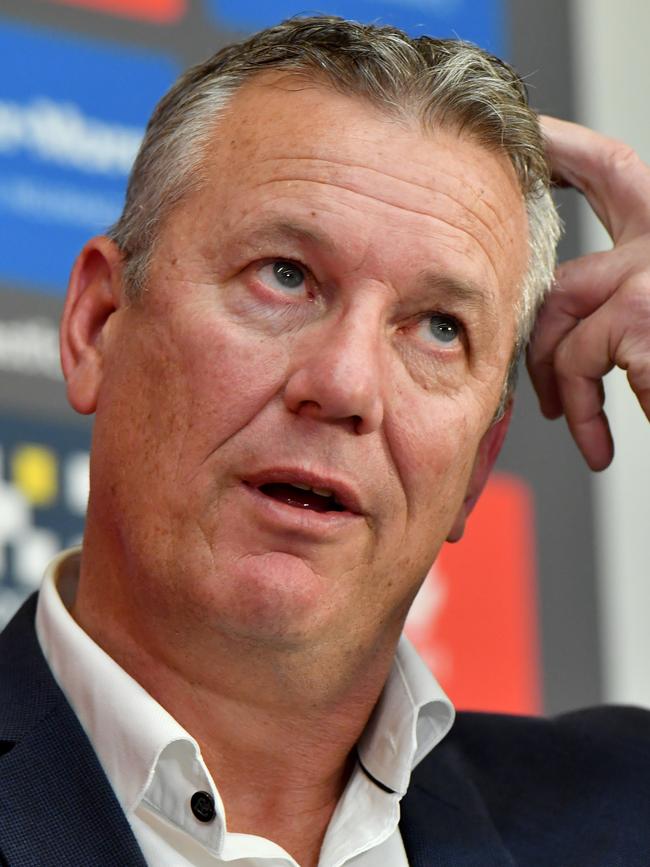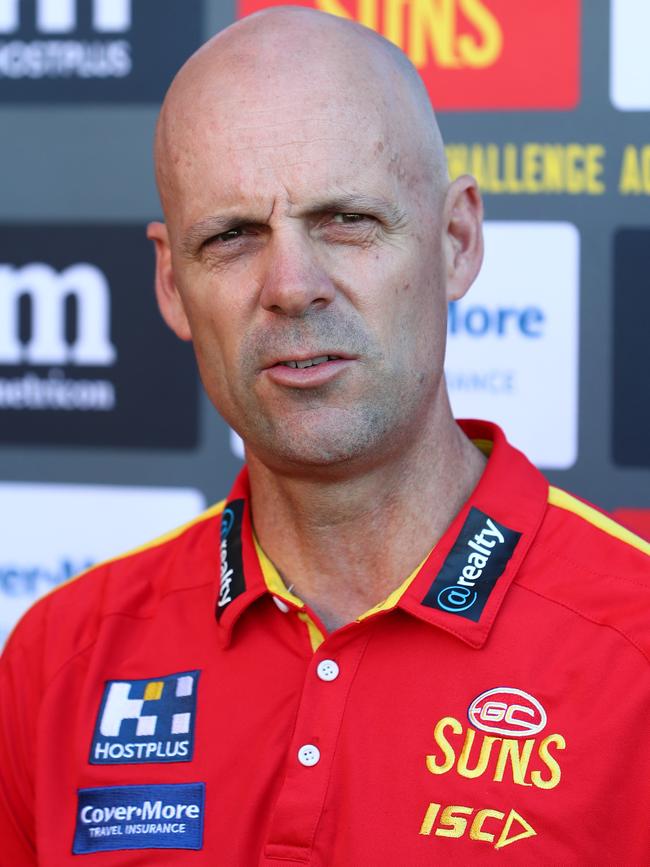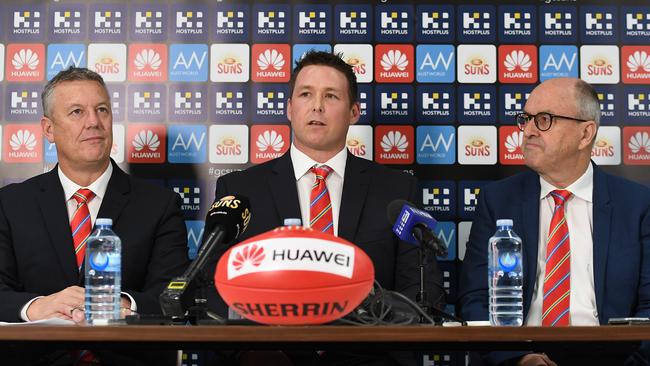Inside the culture concerns, boozy warning signs and failed leadership at the AFL’s $250m disaster club
Gold Coast has won just 22 per cent of its matches with Stuart Dew as coach and there are further headaches for him off the field.
AFL
Don't miss out on the headlines from AFL. Followed categories will be added to My News.
Gold Coast Suns football boss Jon Haines goes by the nickname “The Cameraman” at AFL HQ.
It’s a moniker Haines earned spectacularly for himself after filming senior coach Stuart Dew urinating on a pub wall and posting it to friends on WhatsApp.
Alcohol has never been far from the equation at the hapless Queensland expansion club, as it was last Saturday night when the beers were flowing freely for a large group of players at the Burleigh Pavilion in Burleigh Heads.
Fresh off a listless 50-point loss to Port Adelaide, the celebrations spilled over to a raucous house-party at nearby Burleigh Waters that wound up in the early hours of Sunday morning.
Young players are allowed a social life, but for several observers it was another warning sign that the wheels are again falling off at the AFL’s $250 million disaster club.
And while outspoken Suns chairman Tony Cochrane declared on Fox Footy on Monday night that he did not believe the “go-home” retention factor would be a problem this time around, others insist up to a dozen players, including top draft picks Ben Ainsworth, Will Brodie and Brayden Fiorini, are eyeing the exit door.
Stream selected Fox Footy shows on Kayo Freebies completely free this June including AFL 360, On The Couch, Bounce & more. No Credit Card. No-brainer. Register Free Now


It’s not the way highly-paid Gold Coast chief executive Mark Evans imagined it when he rolled into town four-and-a-half years ago promising to fix the game’s cash-guzzling problem child.
At a gathering with a group of Melbourne football journalists at Cochrane’s Gold Coast home on the eve of the 2017 season, Evans was asked why he had made the move from the AFL’s lofty football operations post to become leader of the Suns. His response was that he wanted to become the next chief executive of the AFL. But like so many who have come before him, Evans is finding out that unwavering self-assurance doesn’t guarantee success on the Glitter Strip.
More than two years ago, Evans launched the “Challenge Accepted” promotional campaign aimed at reversing the flagging fortunes of the club.
“This is a real reset of mindset and attitude,” Evans declared. “We need to inspire the community by what we do on the field and the manner in which we do that.”
But among the revellers on Saturday night were a group of Southport Sharks players from the second-tier competition who now joke that they are the best football team on the Gold Coast.
The Suns under Evans’ watch – even after being gifted another round of generous draft concessions at the end of 2019 – have failed to break the cycle.
Evans has overseen the sacking of coach Rodney Eade and the appointments of Dew, Haines, list boss Craig Cameron and coaching consultant Neil Craig.
After 74 games in charge, Dew, 41, has a worse win-loss record than the two senior coaches who came before him – a miserable 22 per cent.
Dew’s critics say he can be too emotional, takes negative feedback badly and has fallen out with several assistant coaches.
Cochrane failed to fully endorse him this week, admitting that everyone at the expansion club was under pressure.
“Let’s not gild the lily; the coach, the CEO, the president, we’re all under pressure, we’re all under the pump, because we need to be. What we’re serving up, it’s not good enough. And that’s a whole of club problem,” Cochrane said.


The delisting of the contracted Jarryd Lyons (a move not supported by Cochrane) has proved embarrassing, a generous five-year deal for Adelaide’s Rory Atkins raised eyebrows and Cochrane’s ill-timed barbs about Tasmania last week only shone a light back on his own club’s operations.
Despite entering the competition 12 months after the Suns, Greater Western Sydney has humiliated its older expansion brother with years of on-field excellence. The ground lost in player development and player welfare in the Suns’ formative years has never been made up.
When it was suggested to a senior Suns official a few years ago that he should hire highly-respected Giants welfare managers Craig and Melissa Lambert to help bolster player retention, the official openly laughed.
A greater focus was belatedly placed in that space at the end of the 2018 season when highly-respected Brisbane Lions Norm Smith medallist Shaun Hart and ex-Lion Matt Kennedy headed up an expanded welfare team, but both have since left the club.
Kennedy told News Corp this week he had serious concerns about the club’s current leadership.
“There was a dismissiveness and a lack of acknowledgment about the problems at the club,” he said.

“They just didn’t want to know about the behaviour of senior club figures that is holding them back. I’ve been on the coast since I was eight-years-old and would love nothing more than a powerhouse AFL team up here.
“And I’ve known some of the Suns players since they were teenagers, have a deep affection for them and crave that they have some success.”
Kennedy and Hart presented a document to club bosses at the start of last year detailing what they believed were the Suns’ cultural problems.
There was also a view that it was a mistake for prized draft picks Ben King and Jack Lukosius (and later Matt Rowell and Noah Anderson) to be living at Evans’ Gold Coast home, singling them out from teammates.
It goes to a “paranoia” one club figure said about the next batch of high-end talent walking out on the club.
Others say the forced exits of respected assistant coaches Dean Solomon, Nick Malceski and Ashley Prescott (as well as Hart and Kennedy) during last year’s Covid cuts ripped the soul out of the club.
They say it’s an indictment that many of the Suns’ sacked staff are now entrenched in key roles in local football – Malceski is coaching Labrador in the QAFL, while Steve Daniel, Matt Lappin and Matthew Primus are on the coaching panel at Southport.
Few past players, coaches or front office staff have ever left the club on good terms as the leaking of the damning Haines video last year demonstrated.
Former Collingwood president Eddie McGuire last week hinted at the prospect of further football department concessions for the Suns, but patience among rival clubs is wearing thin.
Next up for the Gold Coast is a clash against the bottom-placed Kangaroos in Tasmania – an Australian Rules heartland state some are now saying should be given its own team at the expense of the Suns.
More Coverage
Originally published as Inside the culture concerns, boozy warning signs and failed leadership at the AFL’s $250m disaster club





